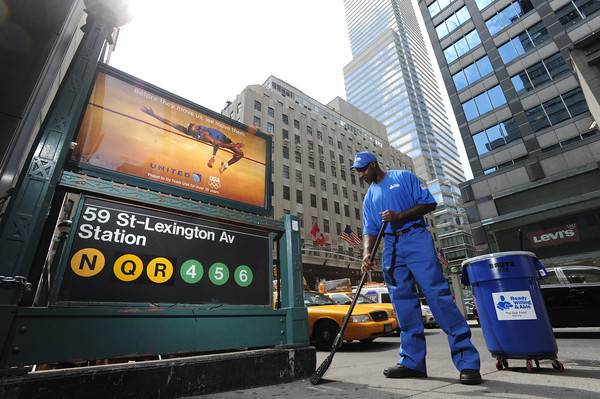Over the years, our Community Improvement Project has grown dramatically; currently, the Men in Blue cover over 115 miles of city streets each day. This growth is in large part due to partnerships with local Business Improvement Districts (BIDs) that contract the Men in Blue to provide supplemental sanitation services to their neighborhoods.
BIDs understand that the services we provide offer tangible, impactful, and immediate benefits to their communities. But by supporting homeless and formerly incarcerated men as they work to rebuild their lives, the benefits are felt by our entire city.
We spoke with Rob Byrnes—President of the East Midtown Partnership—to break down BIDs for us, and how they can further an inclusive recovery for New York City.

So, what is a BID? And what do they do?
Ah yes, “BID 101!” A Business Improvement District is a legally-defined geographic area formed by local stakeholders to provide services in addition to those already provided by municipal government.
The East Midtown Partnership, for example, contracts through Ready, Willing & Able to keep the neighborhood clean. In addition, we provide a local security patrol, horticulture beautification services, commercial promotion, and community events.
We also provide homeless outreach services in the area through a contract with the Bowery Residents Committee. Over the course of almost 20 years, we’ve brought over 1,000 people off the streets and into supportive programming.
Our mission is to keep streets safe and clean, while providing help for people most in need. That keeps commercial property values up and businesses’ doors open. We’re hard-nosed businesspeople—over the years, we’ve seen how there’s an economic incentive to reduce homelessness just as much as there is a moral one.

Tell us about the history of the East Midtown Partnership.
In the late 90s, a group of local executives wanted to add more sanitation and street sweeping services to keep the neighborhood’s business climate strong. They convinced fellow property owners, retailers, and commercial tenants that this would benefit the entire community. Together, they banded together to form the East Midtown Partnership in 2002.
The first service contract we signed was that March—with The Doe Fund! In fact, we were the first major BID to contract with The Doe Fund, and I’m proud that we pioneered such a successful model. Now, The Doe Fund works with BIDs from Madison Avenue to Downtown Brooklyn.
Currently, over 400 commercial properties pay for our services. We have an obligation to perform at a high level of service, which the Men in Blue have always delivered. Our partnership has been going strong for nearly 20 years, and it’s been so fulfilling to provide work to thousands of folks in Ready, Willing & Able in that time.

How can BIDs further an inclusive recovery from the pandemic?
At the beginning of the shutdown in March 2020, the East Midtown Partnership pivoted to the forefront of economic development and small business support. Over the next 17 months, BIDs have been meeting nonstop with the Department of Small Business Services and other organizations like the Chamber of Commerce. That has included developing new programming to support small businesses, advocating for them, educating the Government about their needs, getting them financial relief, and helping them comply with COVID-related requirements.
We’re talking about places people depend on for their livelihoods—restaurants, mom-and-pop stores, you name it—that have been really struggling. We need to keep these businesses afloat and the employees working there from losing their jobs. It’s a massive ripple effect, so for New York City to truly recover, we must continue providing this support.
But more broadly, the partnerships we have with organizations like The Doe Fund and the Bowery Residents Committee show how BIDs can accomplish their bottom line while also driving social good. When we consider what’s next for the city post-pandemic—when we talk about “building back better” or ensuring the recovery is shared equally, that’s the model we need to consider.

